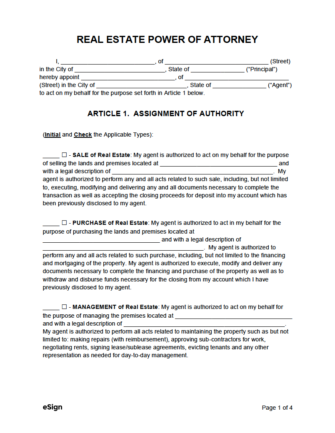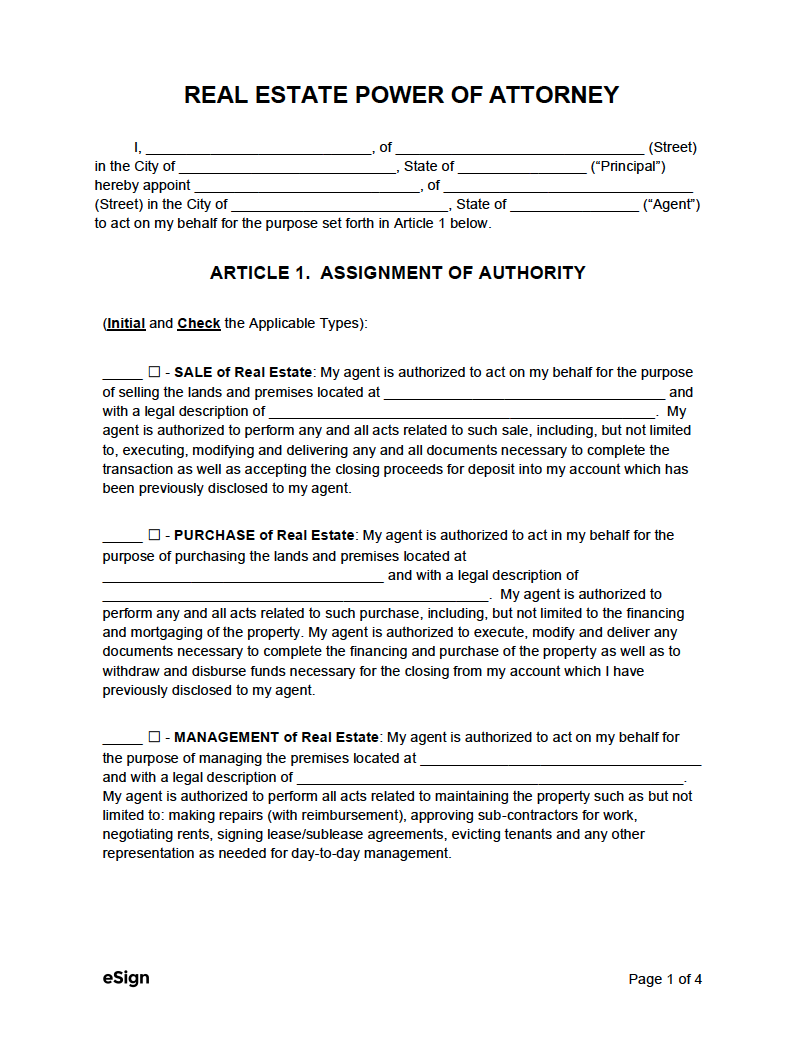Document Features
- Selling– Authorizes the appointed agent to handle the sale of a specific piece of property owned by the principal.
- Buying – Enables the agent to handle the purchase of a specific property for the principal.
- Managing – States that the agent can act on the principal’s behalf concerning the management of a property the principal owns.
- Refinancing – Authorizes the agent to refinance debts secured by a specific property owned by the principal.
- Length of Arrangement – Specifies whether the agent’s powers end on a set date, upon the principal’s death, or upon incapacitation.
Commonly Used For
- Property management
- Purchasing or selling real estate
- Real estate closing
- Mortgage refinancing
- Title transfers
By State
- Alabama
- Alaska
- Arizona
- Arkansas
- California
- Colorado
- Connecticut
- Delaware
- Florida
- Georgia
- Hawaii
- Idaho
- Illinois
- Indiana
- Iowa
- Kansas
- Kentucky
- Louisiana
- Maine
- Maryland
- Massachusetts
- Michigan
- Minnesota
- Mississippi
- Missouri
- Montana
- Nebraska
- Nevada
- New Hampshire
- New Jersey
- New Mexico
- New York
- North Carolina
- North Dakota
- Ohio
- Oklahoma
- Oregon
- Pennsylvania
- Rhode Island
- South Carolina
- South Dakota
- Tennessee
- Texas
- Utah
- Vermont
- Virginia
- Washington
- West Virginia
- Wisconsin
- Wyoming
How to Use a Real Estate POA
Step 1 – Determine the Powers and Term
The principal can structure the form to provide the agent with whatever powers are necessary to complete their assigned tasks. They must also specify whether the agent’s powers extend in perpetuity or are limited to a single task or period of time. In most cases, the POA will terminate on a certain date or after the necessary assignments have been fulfilled.
Step 2 – Select the Attorney-In-Fact
The principal must then choose the attorney-in-fact who will represent them in their real estate transactions. This could be a friend, family member, or trusted professional such as an attorney.
Step 3 – Complete and Sign POA
The principal will need to draft and sign a real estate POA that appoints their chosen agent, describes the authorizations given to them, and relays how or when the authorization ends. Most states also require that the form be notarized.
The chosen representative must obtain a copy of the power of attorney and keep it on their person when they carry out transactions on the principal’s behalf.
Real Estate POA Laws – By State
View State Laws |
||||
| STATE | STATUTE | |||
| Alabama | § 26-1A-204 | |||
| Alaska | Sec. 13.26.665 | |||
| Arizona | N/A | |||
| Arkansas | § 28-68-204 | |||
| California | § 4123(b) | |||
| Colorado | § 15-14-727 | |||
| Connecticut | § 1-351c | |||
| Delaware | § 49A‑204 | |||
| Florida | § 689.111 | |||
| Georgia | § 10‑6B‑43 | |||
| Hawaii | § 551E-34 | |||
| Idaho | § 15-12-204 | |||
| Illinois | 755 ILCS 45/3-4 | |||
| Indiana | § 30-5-5-2 | |||
| Iowa | § 633B.204 | |||
| Kansas | § 58-654 | |||
| Kentucky | § 457.270 | |||
| Louisiana | N/A | |||
| Maine | § 5-934 | |||
| Maryland | § 4-107 | |||
| Massachusetts | 185 § 110 | |||
| Michigan | § 556.304 | |||
| Minnesota | § 523.24 | |||
| Mississippi | § 87-3-3 | |||
| Missouri | § 404.710 | |||
| Montana | § 72-31-339 | |||
| Nebraska | § 30-4027 | |||
| Nevada | § 162A.480 | |||
| New Hampshire | § 564-E:204 | |||
| New Jersey | § 46:2B-8-2 | |||
| New Mexico | § 45-5B-204 | |||
| New York | § 5-1502A | |||
| North Carolina | § 32C-3-303 | |||
| North Dakota | N/A | |||
| Ohio | § 1337.45 | |||
| Oklahoma | 58 O.S. § 1006 | |||
| Oregon | § 93-670 | |||
| Pennsylvania | § 5603(i) | |||
| Rhode Island | § 18-16-3 | |||
| South Carolina | § 62-8-204 | |||
| South Dakota | § 59-12-26 | |||
| Tennessee | § 34-6-109 | |||
| Texas | § 752.102 | |||
| Utah | § 75A-2-204 | |||
| Vermont | V.S.A. § 305 | |||
| Virginia | § 64.2-1625 | |||
| Washington | § 11.125.270 | |||
| West Virginia | § 39B-2-104 | |||
| Wisconsin | § 244.44 | |||
| Wyoming | § 3-9-204 | |||
Sample
ARTICLE 1. ASSIGNMENT OF AUTHORITY (Initial the Applicable Types)
[INITIAL] – SALE of Real Estate: My Agent is authorized to act on my behalf for the purpose of selling the lands and premises located at [PROPERTY ADDRESS] and with a legal description of [PROPERTY DESCRIPTION]. My Agent is authorized to perform any and all acts related to such sale, including, but not limited to, executing, modifying, and delivering any and all documents necessary to complete the transaction, as well as accepting the closing proceeds for deposit into my account, which has been previously disclosed to my Agent.
[INITIAL] – PURCHASE of Real Estate: My Agent is authorized to act on my behalf for the purpose of purchasing the lands and premises located at [PROPERTY ADDRESS] and with a legal description of [PROPERTY DESCRIPTION]. My Agent is authorized to perform any and all acts related to such purchase, including, but not limited to, the financing and mortgaging of the property. My Agent is authorized to execute, modify, and deliver any documents necessary to complete the financing and purchase of the property, as well as to withdraw and disburse funds necessary for the closing from my account, which I have previously disclosed to my Agent.
[INITIAL] – MANAGEMENT of Real Estate: My Agent is authorized to act on my behalf for the purpose of managing the premises located at [PROPERTY ADDRESS] and with a legal description of [PROPERTY DESCRIPTION]. My Agent is authorized to perform all acts related to maintaining the property, such as but not limited to: making repairs (with reimbursement), approving sub-contractors for work, negotiating rents, signing lease/sublease agreements, evicting tenants, and any other representation as needed for day-to-day management.
[INITIAL] – REFINANCING of Real Estate: My Agent is authorized to act on my behalf for the purpose of refinancing my debts, including, but not limited to, any debts secured by a mortgage on the lands and premises located at [PROPERTY ADDRESS] and with a legal description of [PROPERTY DESCRIPTION]. My Agent is authorized to perform any and all acts related to such refinancing, including but not limited to, modifying, executing, and delivering any and all documents necessary to complete the refinancing, as well as to withdraw and disburse funds necessary to complete the refinancing from my account, which I have previously disclosed to my Agent.
ARTICLE 2. TERM
This power of attorney is effective as of the date hereof and shall terminate upon my incapacity, death, or revocation.
ARTICLE 3. RATIFICATION
I, the Principal, grant my Agent full power and authority to perform all acts on my behalf as I could do if personally present, now ratifying and confirming all that my Agent may do pursuant to this power.
ARTICLE 4. GOVERNING LAW
This Note shall be governed by, and construed in accordance with, the laws of the State of [STATE].
ARTICLE 5. REVOCATION
I, the Principal, hereby revoke any existing powers of attorney that may have previously been granted by me relative to the above-described property.
In witness whereof, I have executed this instrument on [MM/DD/YYYY].
Principal’s Signature:
Print Name: [PRINCIPAL NAME]
ACCEPTANCE BY AGENT
The undersigned Agent acknowledges and executes this Power of Attorney, and by such execution does hereby affirm that I: (A) accept the appointment as Agent; (B) understand the duties under the Power of Attorney and under the law.
Agent’s Signature:
Print Name: [AGENT NAME]
NOTARY ACKNOWLEDGMENT
STATE OF [STATE]
COUNTY OF [COUNTY], ss.
On [MM/DD/YYYY], before me appeared [PRINCIPAL NAME], as the Principal who proved to me through government-issued photo identification to be the above-named person, in my presence executed the foregoing instrument and acknowledged that she/he executed the same as his/her free act and deed.
_________________________________________
Notary Public
Print Name: [NOTARY NAME] My commission expires: [MM/DD/YYYY]




